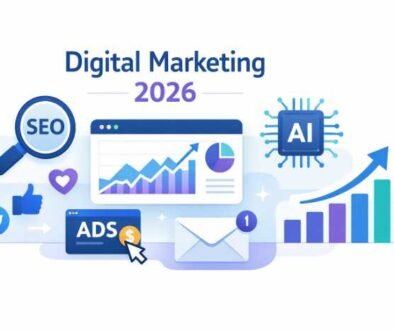Pay-Per-Click (PPC) Advertising
Pay-Per-Click (PPC) advertising is one of the easiest ways to get more people to notice your business online. But if you’re new to it, it might seem a bit confusing. Don’t worry! In this blog, we’ll explain PPC and share the best practices to get you started.
If you want to learn about PPC advertising and other digital marketing techniques, joining Digital Marketing courses in Pune is a great way to get hands-on experience.
Table of Contents
What is PPC Advertising?
PPC stands for “Pay-Per-Click.” It is a type of online advertising where you pay money every time someone clicks on your ad.
For example, you might have seen ads at the top of Google search results. Businesses pay for these spots. When a user clicks on an ad, the business pays a small fee to the platform, like Google or Facebook.
It’s a quick way to get your website in front of people who are actively searching for what you offer.
Why is PPC Advertising Important?
- Instant Results: Unlike SEO, which can take time, PPC ads can bring traffic to your website immediately.
- Targeted Audience: You can choose who sees your ads based on factors like location, age, or interests.
- Measurable Results: PPC platforms provide data showing how many people clicked on your ad, how much you spent, and whether it resulted in sales.
- Budget Control: You decide how much you want to spend. This makes it a good option for small businesses.
If you’re unsure how to start, consider joining a Digital Marketing training institute in Pune to learn the basics of PPC.
How Does PPC Work?
PPC works on an auction system. Here’s how:
- You create an ad and choose specific keywords.
- You decide how much you’re willing to pay for each click.
- When someone searches for one of your chosen keywords, the platform shows ads from businesses that bid on those keywords.
- If someone clicks on your ad, you pay the platform.
For example, if you’re running ads for “Digital Marketing courses in Pune with placement,” your ad might appear when someone searches for that term.
Also Read : The Ultimate Guide to Google Ads With Examples
Best Practices for PPC Advertising
- Start with a Clear Goal: Before creating ads, decide what you want to achieve. Common goals include:
- Driving traffic to your website
- Generating leads (e.g., collecting email addresses)
- Increasing sales
When your goal is clear, it’s easier to measure success.
- Choose the Right Keywords: Keywords are the foundation of any PPC campaign. Use tools like Google Keyword Planner to find keywords your audience is searching for.
For example:
If you offer digital marketing training, target keywords like “Digital Marketing courses in Pune” or “Online digital marketing course.”
Avoid broad terms that might not attract the right audience. Instead, use specific, long-tail keywords like “Digital Marketing courses in Pune with placement.”
- Write Compelling Ad Copy: Your ad copy (the text in your ad) should grab attention and encourage clicks. Here’s how:
- Use clear and simple language.
- Highlight your unique offer (e.g., “Free Trial,” “20% Off,” or “Placement Guarantee”).
- Include a strong call-to-action (CTA) like “Sign Up Now” or “Learn More.”
For example:
“Looking for Digital Marketing classes in Pune with placement? Enroll now for expert training and guaranteed success!”
- Create a Landing Page: A landing page is where users land after clicking your ad. Ensure it:
- Matches the message in your ad.
- Loads quickly and works well on mobile devices.
- Has a clear CTA, like a “Register” button.
For example, if your ad promotes Digital Marketing training institute in Pune, the landing page should provide details about the course, fees, and placement options.
- Set a Budget and Monitor It: PPC allows you to control your spending. Start with a small budget, and increase it as you see results.
Regularly check your ad performance to ensure you’re getting a good return on investment (ROI).
- Use Ad Extensions: Ad extensions are extra information you can add to your ad, like:
- Your phone number
- Business address
- Additional links (e.g., “About Us,” “Contact Us”)
These extensions make your ad more useful and clickable.
- A/B Test Your Ads: A/B testing means creating two versions of an ad to see which performs better.
For example, one ad might say “Join Digital Marketing courses in Pune,” while the other says “Enroll in Digital Marketing courses in Pune with placement.”
Run both ads, and see which one gets more clicks.
- Track and Analyze Results: Use tools like Google Ads or Facebook Ads Manager to monitor your campaign. Look at metrics like:
- Click-Through Rate (CTR): How many people clicked on your ad.
- Conversion Rate: How many clicks turned into actions (e.g., purchases).
- Cost Per Click (CPC): How much you’re paying for each click.
Common Mistakes to Avoid
- Targeting Too Broad an Audience: Focus on a specific group of people who are likely to be interested in your product or service.
- Ignoring Mobile Users: Make sure your ads and landing pages are mobile-friendly.
- Not Updating Keywords: Regularly review and update your keyword list to include new trends or exclude poorly performing terms.
- Not Monitoring Performance: PPC campaigns need regular monitoring to ensure you’re not overspending or targeting the wrong audience.
Benefits of Learning PPC Advertising
PPC advertising is a valuable skill for anyone interested in digital marketing. Whether you want to promote your business or build a career in marketing, knowing PPC can open many doors.
If you want to learn PPC step-by-step, enrolling in Digital Marketing courses in Pune with placement can give you practical knowledge and guidance from experts.
Conclusion
PPC advertising is a powerful way to grow your business online, even if you’re just starting. By following these best practices—choosing the right keywords, writing great ad copy, and tracking your results—you can create campaigns that deliver real results.
If you’re ready to dive deeper into digital marketing, join a Digital Marketing Courses in PCMC. With expert guidance and hands-on experience, you can master PPC and other essential skills to excel in the field.




